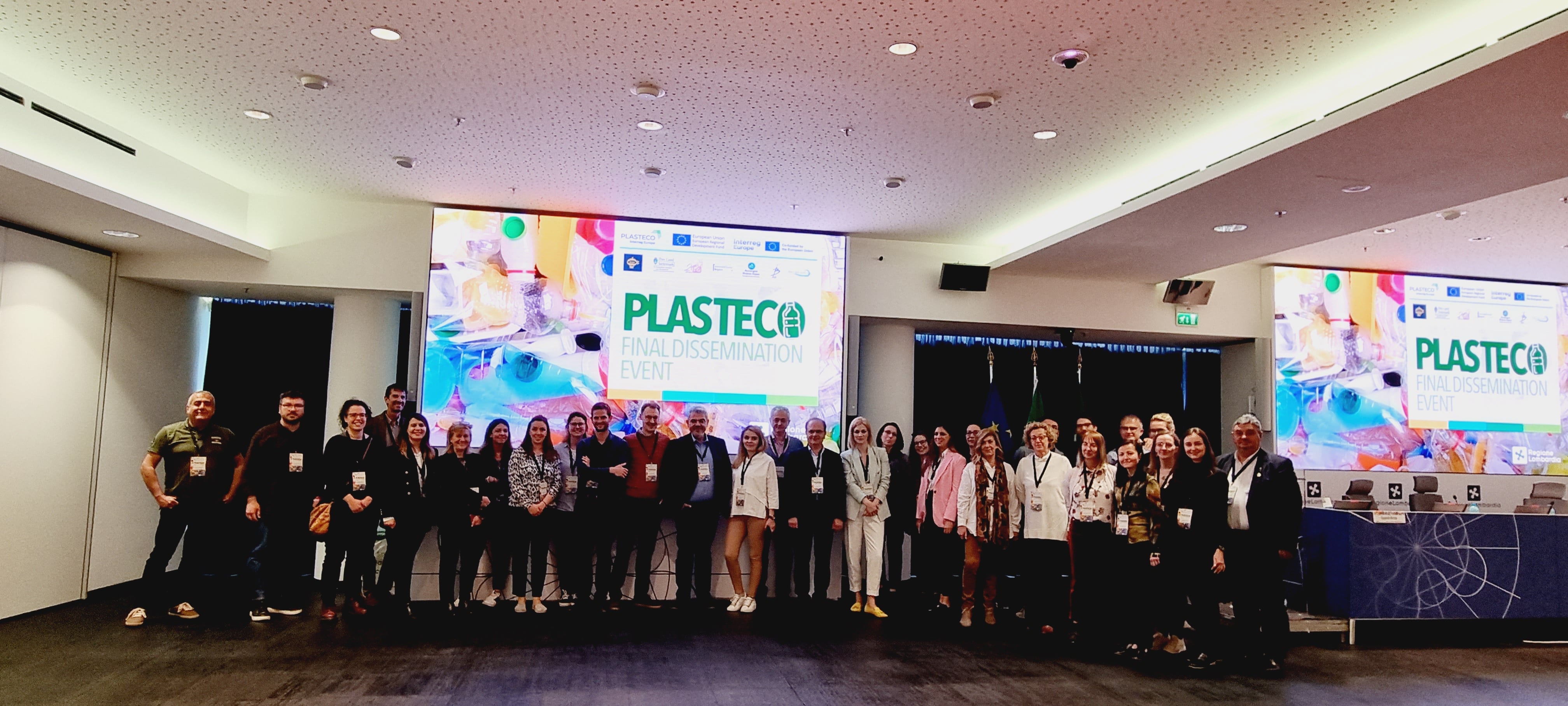
PLASTECO held its Final Dissemination Event in Milan
The PLASTECO consortium organized its Final Dissemination in Milan on 10. May 2023 with a broad audience.
CURBING PLASTICS WASTE AND LITTERING IN EU REGIONS
The widespread plastic pollution necessitates a strong reaction from EU regions, to address growing environmental and health concerns. PLASTECO, in line with the “European Strategy for Plastics in a Circular Economy”, will support participating territories to take the steps necessary for a transition towards a “new plastics economy”. The focus of the project will be on advances in waste management, eradication of single-use plastics from regional value chains, and spurring growth through eco-innovation. PLASTECO will cover the areas of waste management, public procurement, funding/investments, secondary raw materials, and awareness raising.
OBJECTIVE
PLASTECO will support 8 partners from 8 EU countries, through joint policy learning efforts and exchanges of experiences, to benefit from the momentum of the EU plastics strategy and achieve their goals in terms of protecting the environment, increasing resource efficiency, alleviating health effects, and boosting innovation. PLASTECO will enable partners and key stakeholders to:
EXPECTED IMPACT
The implementation of PLASTECO will:
- Lead to increased capacity of 180 staff of public administrations to effectively support new growth trajectories & energy security
- Potential 19 million euros unlocked to support projects on plastic reuse, eco-innovation, alternative technologies
- Increased awareness & consensus building among plastic producers and consumers/the public
MAIN OUTPUTS & BENEFICIARIES
- 8 action plans to improve the addressed policies, benefiting managing authorities & stakeholders
- 4 interregional workshops, 2 study visits, and 2 joint policy planning and strategic review procedures, to promote capacity building among partners and stakeholders
- 3 joint thematic studies on territorial needs and good practices
€1,647,308.00
Environment and resource efficiency
RETHYMNO’s Local Waste Management plan provides a consistent framework for waste related activities in the municipality over the period 2014-2020. The plan was developed in accordance with the National Waste Management Plan (49 ΠΥΣ 15‐12‐2015–ΦΕΚ 174/Α/15‐12‐15), and addresses the territorial challenges related to waste management and environmental pollution. It provides a number of targets and milestones for waste reduction & recycling, incl. actions required to meet those targets.
The plan seeks to ensure that Rethymno has adequate disposal and waste collection capacity, and to decrease Rethymno’s reliance on landfills for disposing of solid waste. The overriding objective is to stimulate a shift from landfilling towards sustainable management options and resource efficiency, by ensuring that local communities and businesses have opportunities to reduce, reuse and recycle waste.
REASONS FOR IMPROVEMENT
1. The plan was drafted before the EU plastics strategy and the Circular Economy Package and sets low targets for plastic recycling & recovery. It thus needs to be updated to include EU recycling targets for municipal and plastic packaging waste.
2. It focuses exclusively on consumption to reduce waste, improve resource use and increase recycling, lacking measures on production that will help transform the way in which products are designed and packaged, increase plastic recyclability, and most importantly make recycling profitable for local businesses.
Lombardy’s ROP comprises 7 integrated priority axes to promote innovation, competitiveness and sustainable development in the region. Specifically, PA 6 prescribes measures to preserve the environment and promote resource efficiency, while PA 1 aims to strengthen technological research, development and innovation.
The ROP, despite not making a clear reference to plastic waste management and circular economy, supports a number of relevant actions:
- Support co-operative innovative activities to develop sustainable technologies and optimise production processes.
- Strengthen the demand for innovation in green products through public procurement.
- Increase environmental attractiveness and resilience through protection measures.
REASONS FOR IMPROVEMENT
1. There is the need to update the criteria used in GPP so as to encourage the supply of products made from recycled plastic materials or contain plastic components that have a greater durability and are recyclable.
2. Additional measures need to be taken to: a) stimulate the emergence of new companies that provide circular solutions (e.g. reverse logistics for packaging) and b) encourage synergies between businesses for exchanging plastic wastes and residuals in a circular economy model.
3. The ROP does not link the protection of the natural heritage with the need to decrease the amount of plastic waste released into the environment, polluting both aquatic and terrestrial ecosystems.
OBJECTIVES & MEASURES
The policy instrument has 6 priority axes and aims to foster green economic growth & contribute to achieving the Europe 2020 targets for smart, sustainable and inclusive growth. With regards to the issue tackled by PLASTECO, it addresses Thematic Objectives 6 “Preserving and protecting the environment and promoting resource efficiency”, and 4 “Supporting the shift towards a low-carbon economy”, through priority axes 4 and 3 respectively.
REASONS FOR IMPROVEMENT
The policy instrument needs to be adapted to the “European Strategy for Plastics in a Circular Economy”, which stresses the fact that in Styria, Austria, and the EU, the potential for recycling plastic waste and corresponding investments remains largely unexploited, due to the low amounts of recycled plastics compared to other materials, and low profitability.
The policy instrument will be improved, through PLASTECO, by proposing measures to: -Support eco-innovations that make recycling plastics easier.
- Improve the separate collection of plastic waste.
- Modernise Styria’s recycling capacity.
- Create viable markets for recycled plastics in Styria.
This way, STYRIA will manage to increase the recycling rates of plastics and reduce their incineration, thereby promoting resource efficiency in its urban centres and fostering the shift to a low-carbon economy.
OBJECTIVES & RELEVANT MEASURES
The OP ‘Environment’ 2014-2020 comprises objectives whose aim is to improve waste management capacities, in line with national and EU instruments and priorities for sustainable growth. The OP supports investments along 6 Priority Axes. PA2 – Waste supports measures for improving municipal waste management as outlined in the National Waste Management Plan and the EU Resource Efficiency Roadmap (O3.1, 3.2, 4.1) and in other national and EU policies. The OP’s central purpose is to implement waste prevention measures and environmental protection investments, including waste re-use, recycling and recovery to reduce the amounts of waste going to the landfill.
REASONS FOR IMPROVEMENT
The national 2020 recycling target of 50% can be attained through measures targeting plastic waste specifically due to their extensive use in both production and consumption. Plastic waste prevention, re-use and recycling requires the integration of a ‘circular’ economy rationale, as outlined in the “European Strategy for Plastics in a Circular Economy”. The OP could increase its effectiveness in terms of reducing crucial waste mass caused by non-reusable and/or not recycled plastics that account for the bulk of solid environmental pollutants. Advancing cross-sectoral synergies to reduce, and in certain cases even eliminate plastic waste output back into the environment, is predicted to be an effective way of reaching the OP’s target of reducing anthropogenic impact.
OBJECTIVES & MEASURES
‘Future Guidelines for Augsburg’ (FGA) is a policy instrument that aims to form an orientating basis for the sustainable development of the City of Augsburg. FGA aims to cover all aspects of sustainability (environmental, social, economic, cultural) and, in particular, resource efficiency and waste management and recycling through: a) axis A2: Improve energy and material efficiency, and b) priorities A2.1 Resource-efficient and Resource-saving economies, and A2.2 Strengthening circular economy processes and recycling.
REASONS FOR IMPROVEMENT
To tackle the requirements of the “European Strategy for Plastics in a Circular Economy”, and, in general, optimise plastic waste management and recycling in Augsburg, FGA priorities A2.1 and A2.2 need to be updated by including specific initiatives about reducing (micro-)plastics in freshwater environment and optimising circular economy processes to incentivise plastics’ reuse and reduce single–use plastics. With the help of PLASTECO, FGA will not only describe priorities A2.1 and A2.2 as aims, but will be able to move beyond forming the foundations of sustainability in Augsburg, towards the development and integration of a complete strategy, with the participation of all relevant stakeholders, to make Augsburg a model community in the area of plastic waste management.
OBJECTIVES & MEASURES CONCERNED
The Regional ERDF programme Rhône-Alpes 2014-2020 aims to boost green economic growth and to achieve the Europe 2020 targets for smart, sustainable and inclusive development. About 30% of the budget is allocated to promoting resource efficiency and tackling climate change. It is structured around 6 axes and includes 22 specific objectives.
2 axes and 3 specific objectives include actions relevant to PLASTECO:
A1, SP2: Supporting eco-innovation in products and services
A1, SP6: Encouraging the transition to ecological businesses & SMEs
A2, SP15: Improving waste management processes & reducing waste
REASONS FOR IMPROVEMENT
- The ROP needs to integrate provisions from the “European Strategy for Plastics in a Circular Economy” document into policy incentives aiming to boost innovative business solutions across the life cycle of plastic (e.g. in the field of production, cleanup efforts and collection systems, and recycling).
- Additional measures required for introducing green public procurement criteria on the use of plastic, reducing significantly the use of plastic materials or promoting plastics with grater durability in public contracts.
- Improved capacities required for developing quantitative approaches that monitor plastic consumption and its environmental impact.
The ROP aims at promoting smart sustainable and inclusive growth in all regions in the country, by addressing major development strategies such as regional competitiveness, environmental protection, the low-carbon economy, and economic/social infrastructure.
PLASTECO will address:
PA 5: Improvement of the urban environment and preservation, protection and sustainable valorisation of cultural heritage
TO 6: Preserving and protecting the environment and promoting resource efficiency
Investment Priority 6c (natural heritage) – Investment Priority 6e (urban environment)
The OP makes explicit mention on the importance to protect the urban environment through sustainable development, prescribing measures to improve Romania’s environmental status (e.g. green spaces and energy consumption in buildings). Nonetheless, it does not address the need to protect the urban environment from the accumulation/fragmentation of plastic waste. The OP does not take into account the threats posed by plastic production to air and soil quality, human health, biodiversity and resource efficiency, and thus lacks measures to curb plastics waste and littering.
The policy instrument needs to be adapted to the EU Waste Framework Directive and the Circular Economy Strategy, to include actions that will a) decrease the landfilling rate for solid waste, b) expand the separate collection of plastic waste, c) modernise treatment facilities and increase recycling capacity, and d) promote eco-innovation.
OBJECTIVES & MEASURES
Operational programme “Growth and Employment” (OPGE) aims to foster the competitiveness of Latvian economy by prioritising (among others) the sustainable use of natural and cultural resources, and balanced and sustainable territorial development. In this context, PLASTECO will develop and propose best policies & practices for plastic waste management & recycling congruent with OPGE priority axis 2.5. ‘Protection of environment and effective use of resources’, and Specific Objective 5.2.1: to increase re-using, recycling and regeneration of various sorts of waste.
REASONS FOR IMPROVEMENT
Addressing the requirements of the “European Strategy for Plastics in a Circular Economy”, needs to be integrated to OPGE actions so as to strengthen the fulfilment in Latvia of the EU environmental acquis in the area of waste (Directive 2008/98/EC, Directive 1999/31/EC, Directive 94/62/EC, Directive 2012/19/EC, 2000/53/EC), particularly with respect to plastic waste recycling. Integrating the provisions of the European Strategy for Plastics in a Circular Economy through PLASTECO, will ensure that OPGE will be improved through concrete measures aimed at a) reducing the amount of waste from plastic packaging exported due to inefficient recycling, b) fostering the recycling or regeneration of household plastic waste, and c) attracting investments in the area of plastic waste management.

The PLASTECO consortium organized its Final Dissemination in Milan on 10. May 2023 with a broad audience.
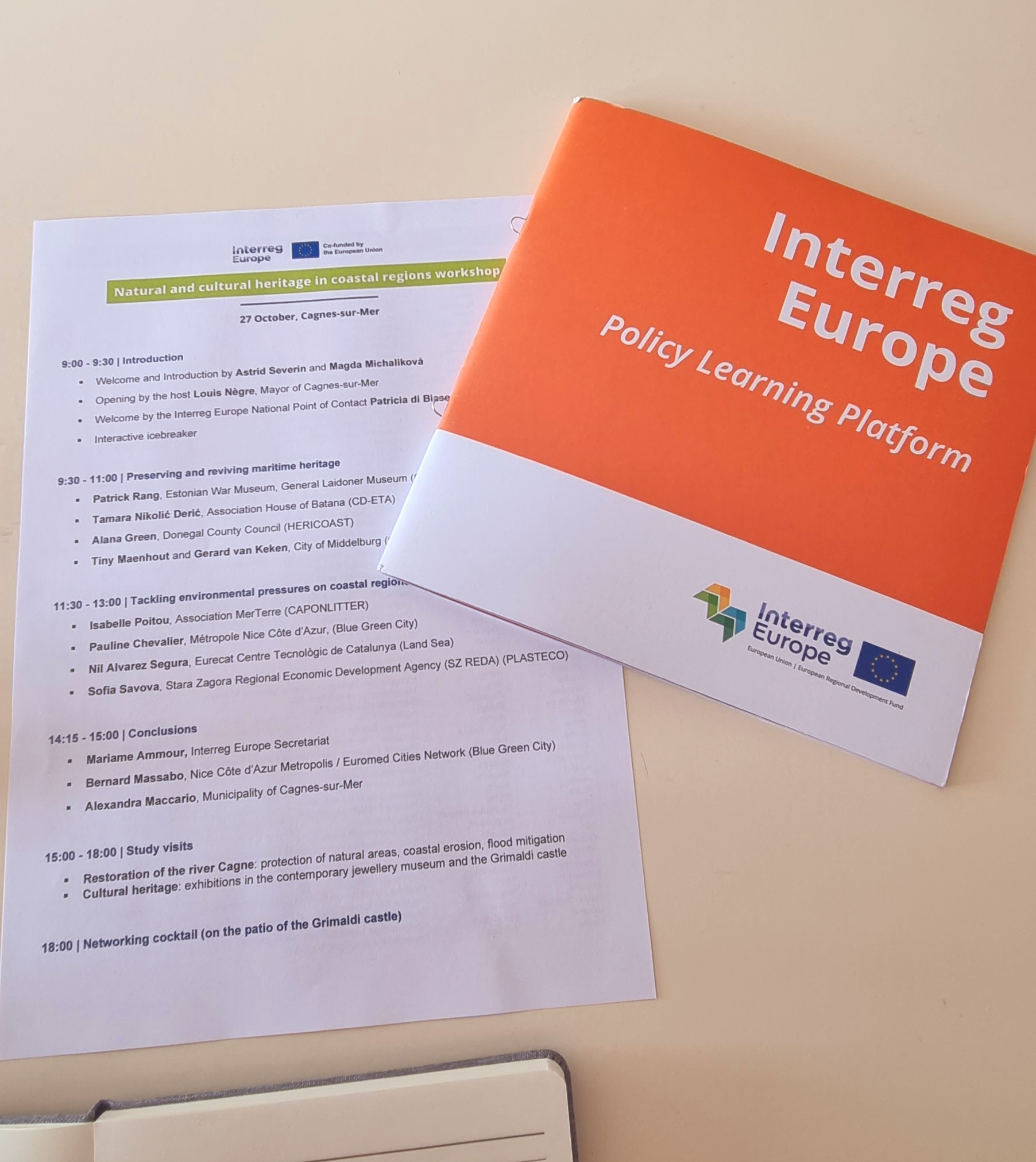
SZ REDA presented PLASTECO intervention in the sphere in plastic marine litter
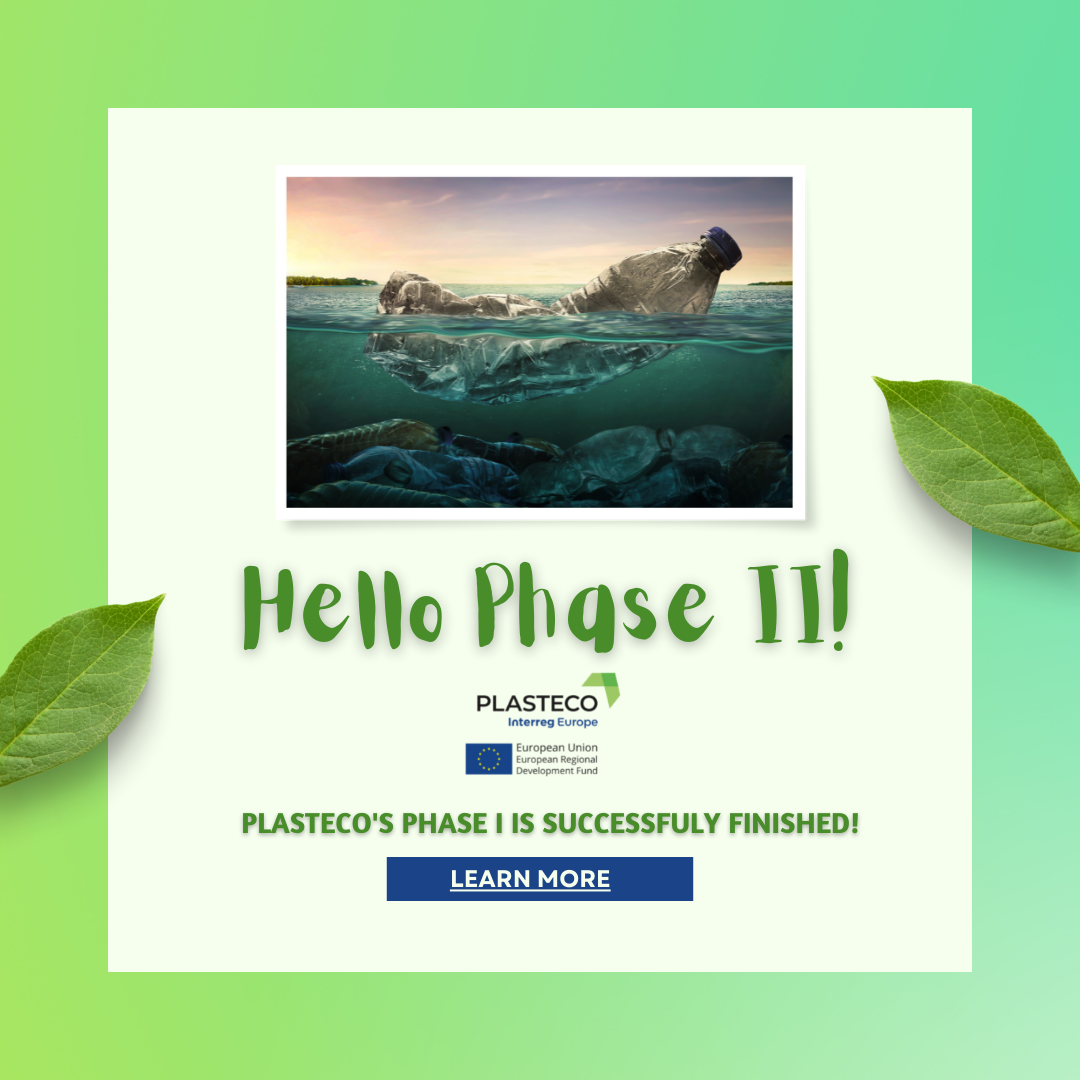
INTERREG Europe project PLASTECO finalized successfully Phases I and launches Phase II
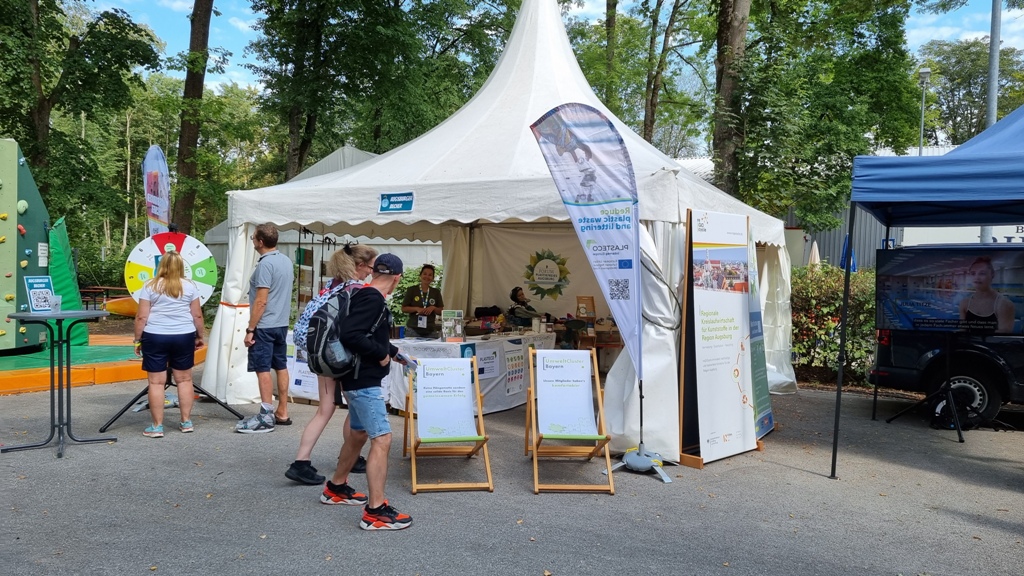
The grand final before phase II - this is how the PLASTECO information day at the canoe slalom world championships Augsburg 2022 can be summarized.
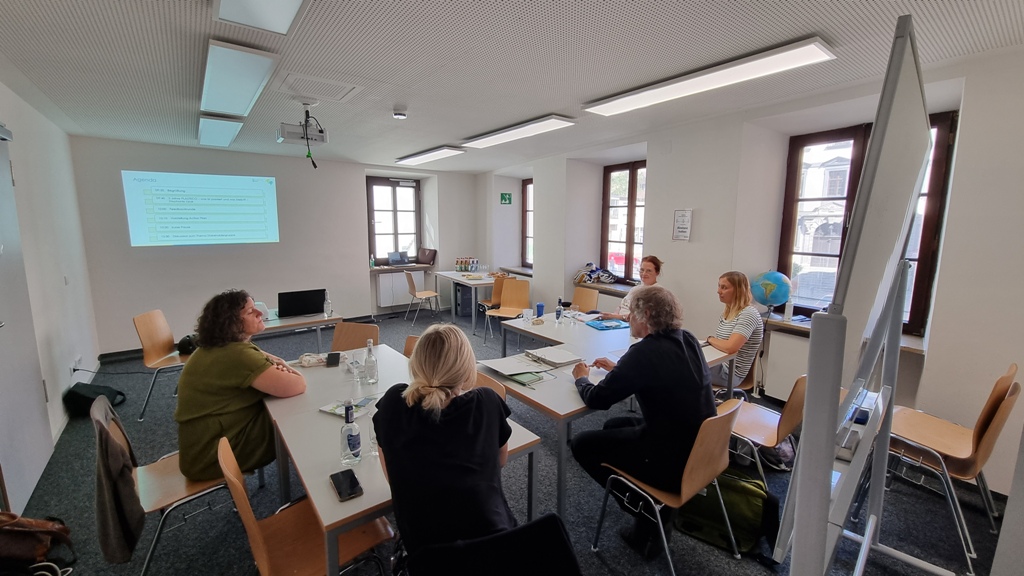
On July 14, 2022, the sixth and last stakeholder meeting within the PLASTECO project took place in Augsburg, Germany
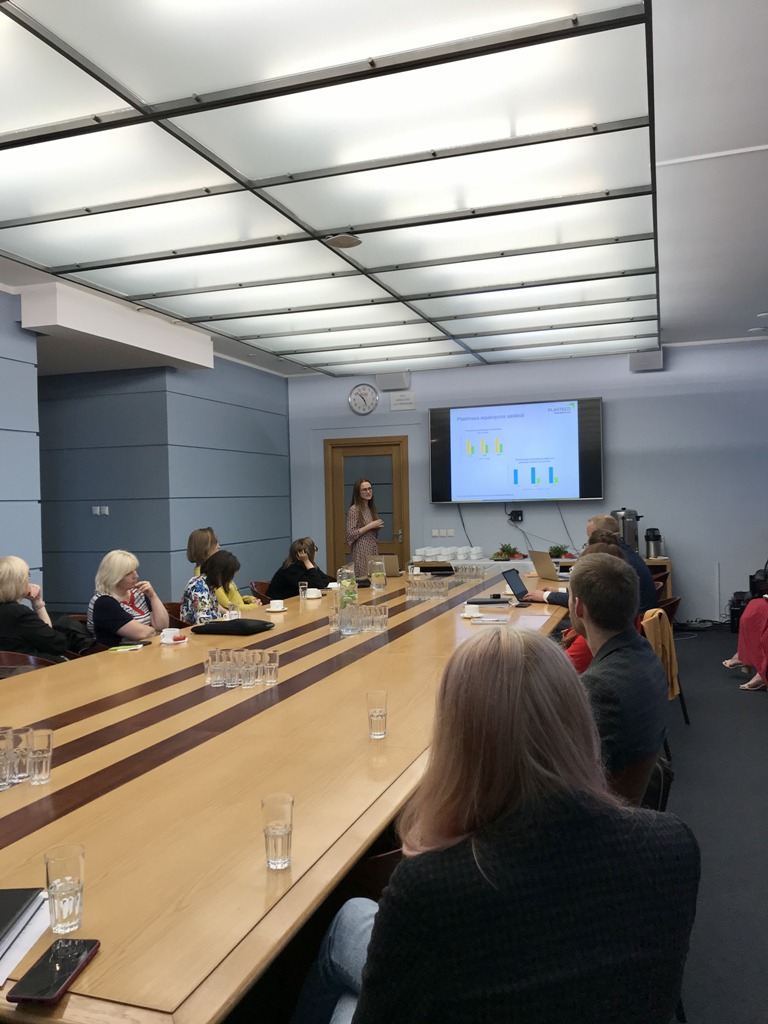
On July 13, 2022, the association Baltic Coasts held the last regional stakeholder meeting of PLASTECO in Latvia.
Last meeting with stakeholders was organized by SZ REDA with focus ecologists from the municipalities
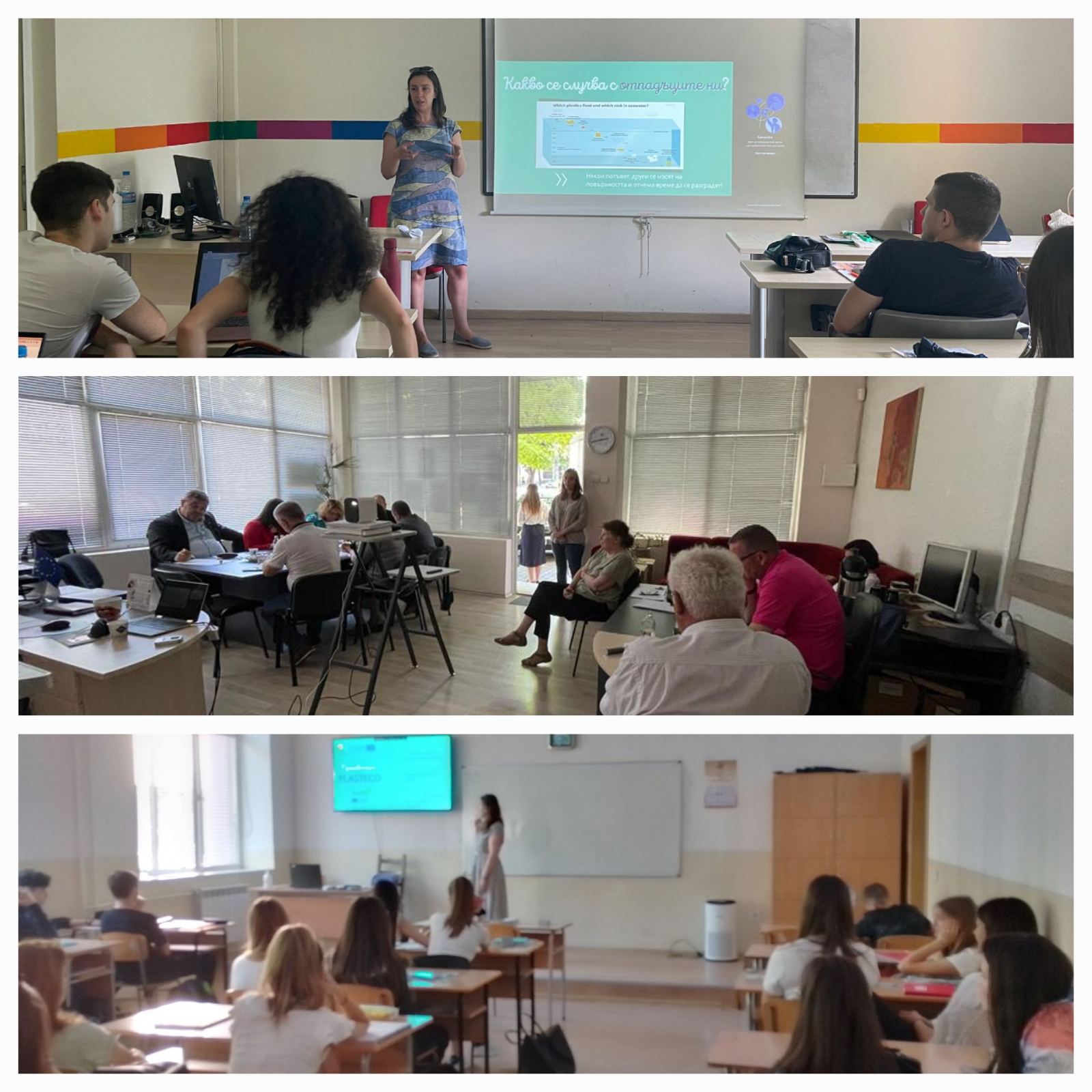
National PLASTECO info day was conducted in Bulgaria with 3 different audiences.
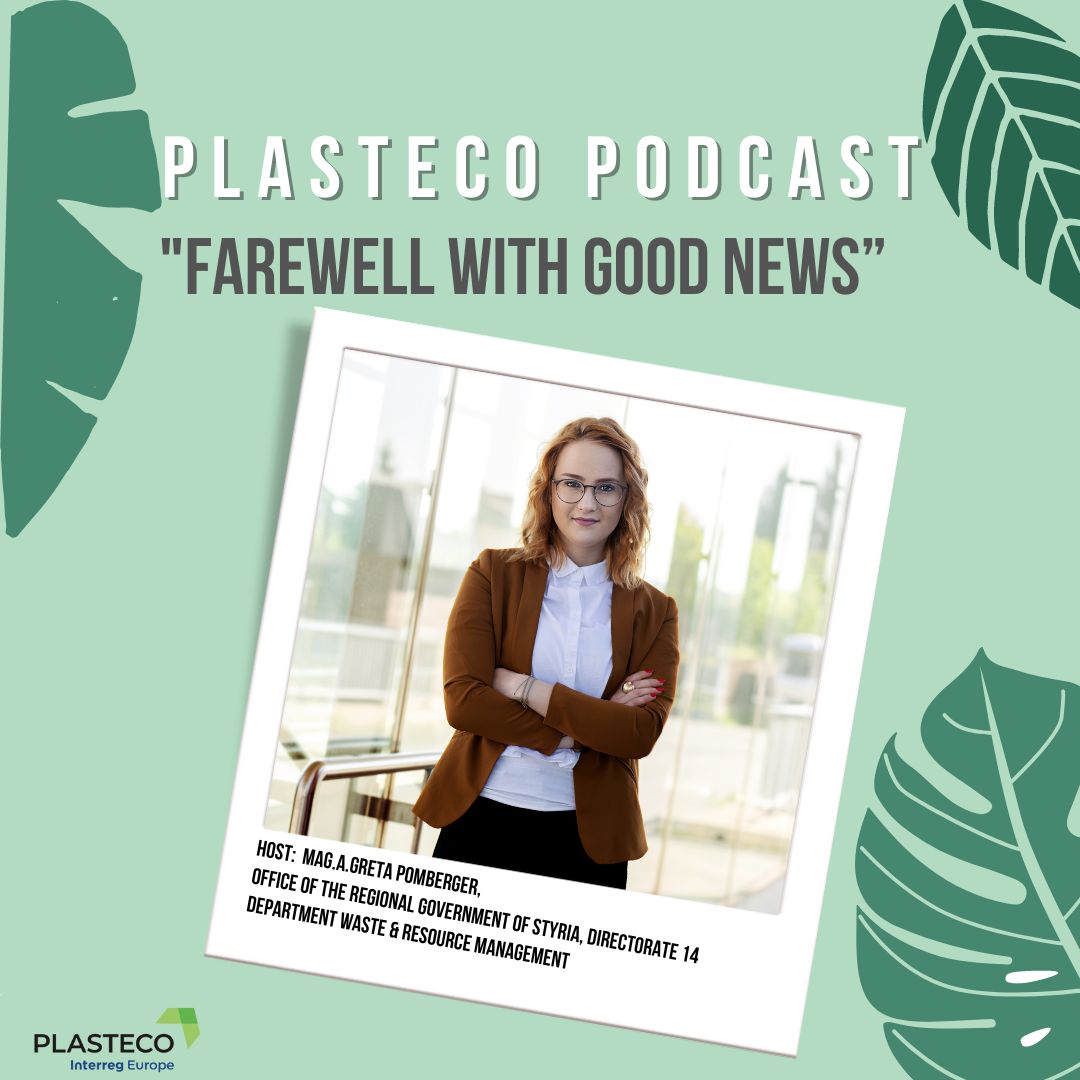
The 9th PLASTECO podcast episode is out now!
Rethymno has successfully completed PLASTECO’s info day on 28 June 2022.